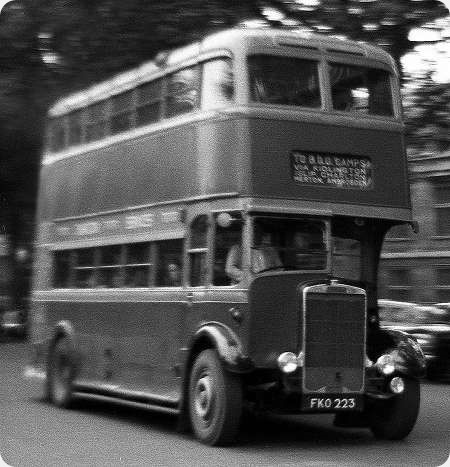Charlton-on-Otmoor Services – Leyland TD – FKO 223 – 293
Charlton-on-Otmoor Services
1939
Leyland TD5
Weymann H28/26R
Not one of my best pictures, I fear, but the Comet S camera did not cope well with action shots. Seen on its way out of Oxford in 1960 is FKO 223, a Leyland TD5 with Weymann H28/26R bodywork. This bus was delivered in 1939 to Chatham & District where it operated as No. 293 until 1942 when it then passed to parent company Maidstone & District as DH365. It was bought by Charlton-on-Otmoor Services in November 1955. It is thought that this bus still remains in existence, but information about its present status is scanty.
Photograph and Copy contributed by Roger Cox
18/11/19 – 10:41
What a beauty! Had sadly left Charlton-on-Otmoor services by the time I came to Oxford in 1971. Intrigued to hear that it may have survived!
Ian Thompson
23/11/19 – 06:58
What a handsome bus! How like an AEC were those TDS of the period – two fine British champions of the psv world – worldwide….
I expect we’ve all noticed how nut-rings set off the front wheels, and beautify the overall image. Manufacturers which eschewed them produced utility- looking buses and coaches – just for the sake of those trims. Guy springs to mind, and posh buses with the nut-rings removed in service as contractors site transport, looked truly down-at-heel!
Who can tell me why London transport removed thousands of rear-wheel spats in the 50’s? Those full discs looked very sleek. Few other operators employed them – why?
Victor Brumby
23/11/19 – 13:46
My 2006 copy of Preserved Buses shows FKO 223 as owned by Gibbons, Maidstone. It may well have moved on now of course but hopefully still about in one piece.
John Darwent
23/11/19 – 13:47
Those rear wheel discs caused brakes to overheat. Burys PD3s them for a very short time when new but they were very quickly binned. Some of Manchesters Fleetlines had them too and, again, they were quickly discarded. I personally didn’t like them much.
No name given, yet
24/11/19 – 15:08
The Gibbons Brothers still own it but have partially stripped it for components. They are asking too much money for it to be a worthwhile restoration exercise unless you have a real passion for M&D.
Roger Burdett
29/11/19 – 05:54
I think that bus bodies, in the 1938-39 period, finally reached a classic shape, although I never really liked the fluting at the bottom of Weymann’s bodies. I travelled on the Leyland TD4 STL-copy STD’s of London Transport and they looked smart. Their fruity roar and crash gearbox slow changes gave a young lad goose pimples…..until girls overtook my bus passion!
Chris Hebbron
29/11/19 – 10:10
In regard to previous comments about nut guard rings and rear wheel discs, firstly London Transport removed the rear wheel discs across the fleet in the 1970s, not the 1950s. Manchester ordered discs for all its double deck fleet, except the first batch of Atlanteans, until 1964. The discs don’t cause brake overheating. Manchester in particular had a thing about overheating brakes and regularly cut back front mudguards yet ordered the discs. The reason many fleets didn’t use them and why they were often discarded, in Manchester’s case unofficially and to the ire of authority, was the same reason as the wholesale removal in London – efficiency. They had to be removed every time tyre pressures needed checking, every wheel change and every time wheel nut tightness needed to be checked. On large fleets this added considerable time to maintenance and when accountants costed this and cost won out over appearance, they were officially removed – something Manchester depot foreman had been doing for years, reporting them lost in service.
Nut guard rings were brought in to do exactly what their name implies – to stop drivers using the wheel nuts as steps into the cab. Leyland designed a ring with holes through which nuts could be tightened but only a minority of their chassis were ordered with these. Whilst many operators discarded the rings for the same reason as they discarded or didn’t order discs, others decided the extra effort in maintenance was worth it to protect the wheel nuts.
Phil Blinkhorn
06/01/20 – 11:11
Regarding previous incorrect comments concerning FKO 223. My brother Chris and I have owned this handsome classic since 1993 (Surely Weymann at it’s best!)
We’ve never actually offered the vehicle for sale.
It’s true the major components are removed but have been/are being completely reconditioned. This has cost many pounds so far as parts have had to be re-made and spares hard to source. We’ve restored many other buses and do fund 99% of work ourselves, not having luxury of a dedicated workforce.
Due to health issues we would consider passing this fine bus on, but only to someone with the wherewithal, dedication and determination to complete the project to a top class standard.
The bus still wears its ‘as withdrawn’ Charlton on Utmoor livery.
Rob Gibbons
10/01/20 – 11:52
Wonderful to hear that FKO 223 is safe. Restoration can be a very long-term business, often entailing periods where to the outside world nothing seems to be happening. Very glad too to hear that she still wears Charlton-on-Otmoor livery.
Ian Thompson
Quick links to the - Comments Page - Contact Page - Home Page
Comments - Please note: The comments facility is not currently available. Please see the home page for updates.
Please Note if you want to send a photograph with your comment please use the Contact Page by clicking here or send as an attachment via email.

